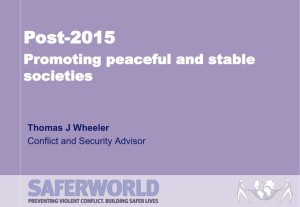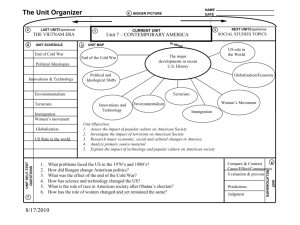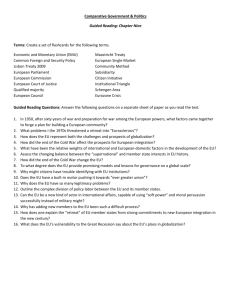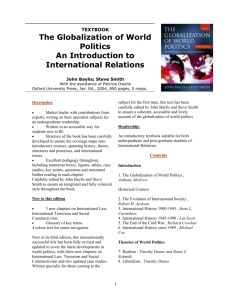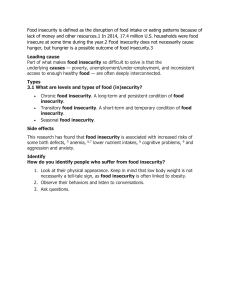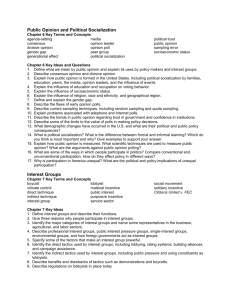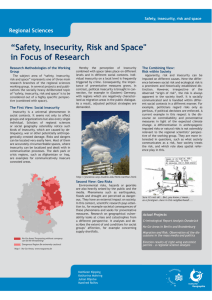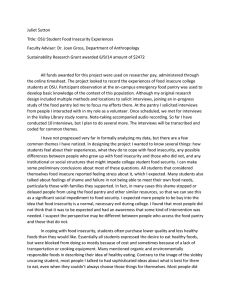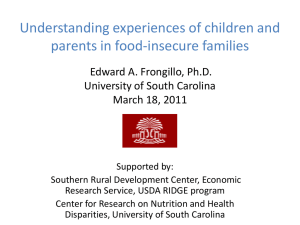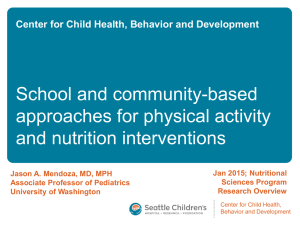Final Exam Review - Columbia College
advertisement
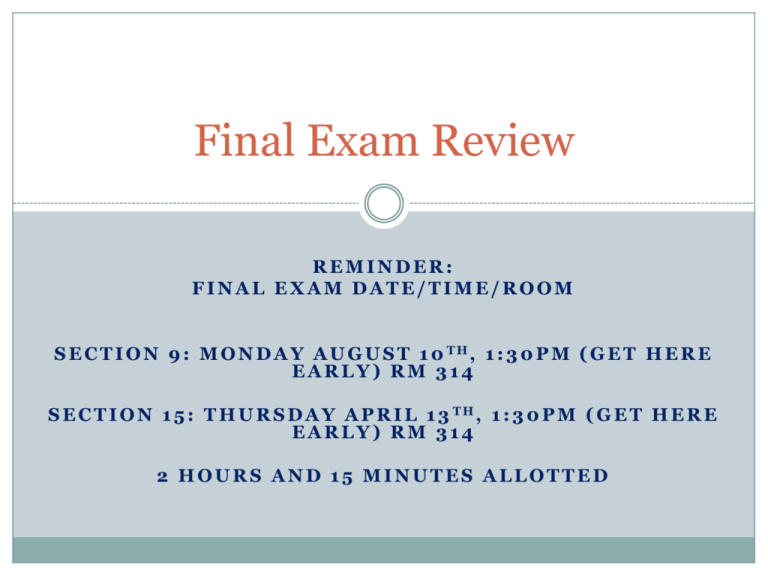
Final Exam Review REMINDER: FINAL EXAM DATE/TIME/ROOM S E C T I O N 9 : M O N D A Y A U G U S T 1 0 TH, 1 : 3 0 P M ( G E T H E R E EARLY) RM 314 S E C T I O N 1 5 : T H U R S D A Y A P R I L 1 3 TH, 1 : 3 0 P M ( G E T H E R E EARLY) RM 314 2 HOURS AND 15 MINUTES ALLOTTED Important Concepts from the First Half of Term What is the Treaty/Peace of Westphalia What important political concepts emerged from this treaty How did it change the concept of legitimacy among those that ruled the state What is the difference between vertical and horizontal divisions of power What is nationalism and why do governments pursue it Chapter 8: Socialization What is political culture? How does it differ from culture? What’s the difference between parochial, subject and participant political cultures? What’s a subculture? How does it relate to liberal democracy? What is political socialization? When and how does it occur? How are media and public opinion polling impacting politics and socialization? What is public policy, what are the inputs governments use to create public policies? Who are lobbyists, interest groups and policy communities? What is corporatism? Chapter 9: The Developed World What are the similarities and differences of the political systems in Canada, the US, Japan and the EU (don’t worry too much about history)? Who are we speaking of when discussing the developed world? What are other terms for the developed world? Why is wealth an inadequate measure of development? What is autarky? Why does the world not subscribe to this anymore? What is the Bretton-Woods Agreement? How does it relate to the World Bank, IMF and GATT? Chapter 10: The Developing World What are the similarities and difference of governance systems in China, India, Mexico and Mali? How has development differed in each of the se states? What are the similarities and differences that states the developing world and the developed world face? What are LDCs and NICs? What is the relationships with young states and legitimacy? Why are and what kinds of institutions so important for democratization in developing states, why does this mean that democratization in developing states is difficult? Why is sovereignty a challenge for developing states, how do some governments use sovereignty? Why was development in South Korea, Japan and Singapore different than we’ve seen elsewhere? How is development in South America unique? Should developing states focus on economic or political development? What are the challenges and benefits of high population growth? What’s the reputation and role of international organization in the developing world? Chapter 11: International Politics How can one challenge the term global village? How has the global age given rise to tribalism? Why is international politics a state-centric field? What is the role of the Treaty of Westphalia in this process? What is an international system? Does it exist? What’s a subsystem? What are the units of analysis in international politics? What is globalization and how has globalization changed since WW2? How has cultural, political and economic globalization change people’s attitudes towards the wider world? What are the differences in realist, liberal and Marxist international theory? What are the strengths and critiques of these systems? What are important components in the development and evolution of foreign policy? Chapter 12: Security and Insecurity What is security and why is it often an imagined concept? How does geopolitics impact security and insecurity? How has this changed in the globalized world? What is insecurity? What’s the difference between local, regional and universal insecurity? Examples? What is the relationships between insecurity and the security dilemma? Is conflict natural in the world? How does Clausewitz conceive the role of war in the world? Why, in practice, might this be problematic? What is terrorism, why are terrorists illegitimate actors and why is terrorism and attractive political tool to some? Why is the response to terrorism in democratic states problematic? What is political alienation? What are the benefits and concerns associated with humanitarianism? What tools are available to overcome conflict internationally? Chapter 13 International Political Economy What is political economy? What is economic interdependence and cooperation? What are the GATT and the WTO? Concept of reciprocity What is the Latin American debt crisis How did it impact the international monetary system? What are the relative impacts of the 1990s International Finance Crisis and the Great Recession of 2008 What is economic regionalism? What is and has been the role of oil in political economy? How has it changed? What is the role of corporations in political economy? …so that’s it. Good Luck!
